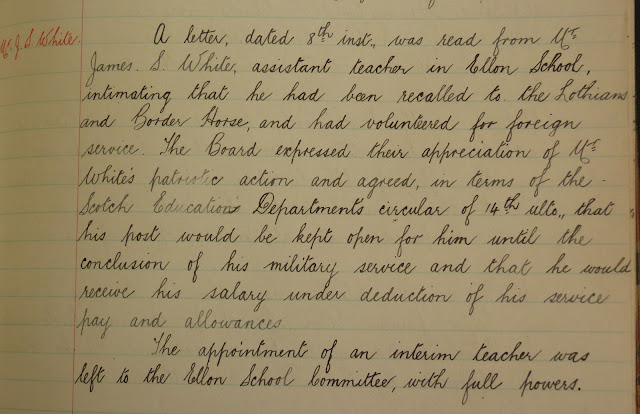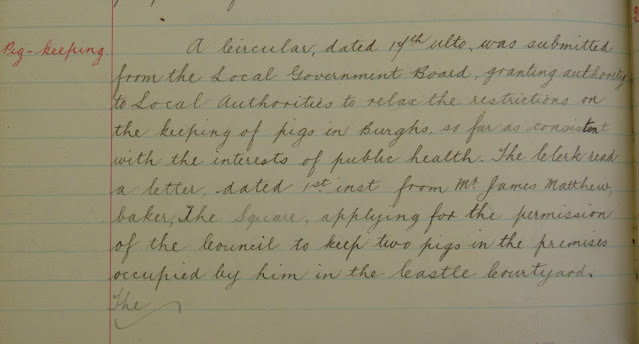Remembrance Day: Ellon during World War 1
As the United Kingdom commemorates the end of the First World War with Remembrance Sunday, our Archive team have collated some material related specifically to Ellon during and after WW1.
Many citizens joined the Armed Forces during the war and the residents of Ellon were no exception to this. James Samuel White (born Caddonfoot c. 1882) was an assistant teacher in Ellon who was recalled to the Lothians and Border Horse (Yeomanry regiment of the British Territorial Army) on the outbreak of War.
 |
| © IWM Art.IWM PST 12055 |
[More information on the Lothians and Border Horse can be found via the East Lothian Council website].
Before Mr White left, he sent a letter to the Ellon School Board stating that he was volunteering for foreign service. Below is the Board’s response to the letter:
 |
| Ellon School Board: Minute Book AS/ASeln/5 (1914–1919) |
The Board expressed their appreciation of Mr White’s patriotic action and agreed, in terms of the Scottish education department circular of 14th, that his post would be kept open for him until the conclusion of his military service and that he would receive his salary under deduction of his service pay and allowance.
Appeals and Conscription
As the war progressed, appeals were made to encourage people to join up. On 2 October 1914, an appeal meeting in Ellon was reported in the Aberdeen Daily Journal. According to the title, it was an 'enthusiastic public meeting':
Two years later, in 1916, military conscription was introduced across the Country. Able-bodied men aged between 18 and 40 could now be forced to join the Armed Forces. It was possible to appeal however, and in Ellon, a number of farmhands and farmers did so, on account that their farms would not be able to produce food effectively if they were drafted into the military.
Food Shortages
The supply of food was a huge issue during WW1 and there were numerous shortages in Britain. These were caused by U-boat attacks on ships that were delivering supplies, and the increasing supply required
for the front-line troops fighting across Europe.
The newspaper article below (taken from the Evening Express of Friday 16 March 1917) describes specifically the ‘potato shortage’, but also other shortages. It highlights just how concerned Britain was about running out of food. Farming districts like Ellon would have been vital in Britain’s fight against Germany because these would be the primary sources of food for the country.
 |
| Evening Express, 16 March 1917 |
By 1917, a Food Economy Campaign was active in Ellon (as with the rest of the country). You can see more about this in Ellon's Burgh Minutes:
 |
| Ellon Burgh Minutes AS/Aeln/1/4 (1917-1923), 6 Dec 1917 |
Pig Keeping
Pig keeping is another example of the many ways that the North East of Scotland had to alter its mechanisms around food in order to contribute to the war effort and also to ensure those who remained in the country were still fed. Many rural areas were turned over to farming to sustain a supply of food at home. In the minutes below, Ellon Burgh Council were asked by resident James Matthew (baker) for permission to keep pigs on his premises. This was after local government gave local authorities the ability to relax the regulations on pig farming. The request was passed onto the sanitary inspector, who was given the ability to allow the pigs on the premises if it passed inspection:
 |
| Ellon Burgh Minutes AS/Aeln/1/4 (1917-1923) |
 |
| Ellon Burgh Minutes AS/Aeln/1/4 (1917-1923), 3 May 1917 |
By 1918, Ellon School Board had received an update from James White of Ellon Academy - he had received a commission to the rank of lieutenant and transferred to the Machine Gun Corps in 1918. He informed the Board that it did not have to pay him a reduced salary for his old position since his new salary exceeded the salary he used to earn as a teacher.
 |
| Ellon School Board: Minute Book AS/ASeln/5 (1914–1919) |
The entry in the minutes states:
Lieut. J. S. White assistant teacher in Ellon school, intimating that he had obtained a commission in the Machine Gun Corps on 30th October last, at which date payment of the balance of his salary would accordingly cease, and thanking the board for the payments received by him up to that date.
A search of Ancestry's war records highlighted the following record for James White from their Medal Rolls Index Cards:
 |
| Ancestry Medal Rolls Index Card for James White |
The Armistice that ceased all hostilities was signed on 11 November 1918: all fighting stopped at 11am. The day was observed as a Victory holiday and the log book for Ellon Academy details this event:
 |
| Ellon Academy Log Book ED/GR6S/G19/1/2 (1913-1941) |
 |
| Ellon Academy Log Book ED/GR6S/G19/1/2 (1913-1941) |
Ellon Academy's Log book also details Lieutenant White's return to school in January 1919:
 |
| Ellon Academy Log Book ED/GR6S/G19/1/2 (1913-1941) |
We can also see that Mr Michael Dunne, the school's Janitor, was also demobilised and returned to his duties.
In 1919 the King expressed a wish that every community in the county should observe 2 minutes silence every year in memory of the Armistice and those that died during the conflict. Ellon Academy did this in a ceremony that is described here:
 |
| Ellon Academy Log Book ED/GR6S/G19/1/2 (1913-1941) |
The entry reads:
The children were assembled in the Hall of the school
and were addressed by the headmaster, who read the king’s message to his people
and by Ex-Lieut. Ja[me]s S. White who has served his country through the whole
of the War. The Union Jack was lowered to half-mast, in taken of mourning for
our “Glorious Dead” and absolute silence and stillness was observed for a space
of two minutes in accordance with the wishes of our King.
Ellon War Memorial
As residents and locals of Ellon will know, there is a war memorial in Ellon, located in The Square, on the junction of Station Road. The memorial is made of Kemnay granite and features a figure of a Gordon Highlander in a Tam O’Shanter, holding a rifle in ‘on guard’ position. The memorial was designed by Mr James Cobban, Architect of Aberdeen. It was first proposed in 1917, relatively early compared to other council areas. From Ellon's Burgh Minutes, we can see that, at this date, it was decided the proposal should 'lie over' for the meantime:
 |
| Ellon Burgh Minutes AS/Aeln/1/4 (1917-1923). Minutes from 6 September 1917. |
But by the 5th January 1922, the proposals had been confirmed as below:
 |
| Ellon Burgh Minutes AS/Aeln/1/4 (1917-1923). Minutes from 5 Jan 1922. |
The memorial commemorates residents of Ellon who were killed or missing in WW1 (111 names) and also WWII (21 names). The plinth contains the names of the fallen, and the inscription reads:
There is an additional plaque (erected in 2000) to commemorate people killed in other conflicts since WW1.
(Kimberley Smith, Archivist)





Comments
Post a Comment